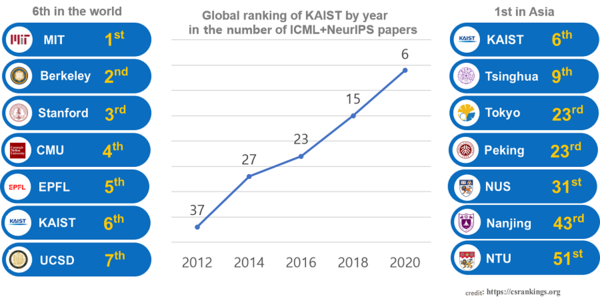
KAIST spearheads efforts to develop AI semiconductors
Korea Advanced Institute of Science and Technology (KAIST) announced on Aug. 4 that it had spearheaded the global efforts to shape the artificial intelligence semiconductor ecosystem.The ivory tower said that its achievements in the field were attracting attention as AI semiconductors became more important across the world.The AI semiconductor gains weight as it is designed specifically for highly complicated computation need for AI to conduct its learning and deducing calculations.KAIST said that it had accumulated top-notch educational and research capabilities in the two core fields of AI semiconductor - semiconductor and AI.Notably, in the field of semiconductors, the International Solid-State Circuit Conference (ISSCC) is the world’s most prestigious conference for designing semiconductor integrated circuits.Established in 1954, with more than 60 percent of the participants coming from companies including Samsung, Qualcomm, TSMC, and Intel, the conference naturally focuses on the practical value of the studies from the industrial point of view.At such a conference of legacy and influence, KAIST kept its presence widely visible over other participating universities, leading in terms of the number of accepted papers over world-class schools such as MIT and Stanford for the past 17 years.In the AI sector, 129 papers were presented by KAIST last year, to account for some 40 percent of Korean papers published at 11 top AI conferences.Thanks to KAIST's efforts, in 2021, Korea ranked sixth after the United States, China, United Kingdom, Canada, and Germany in terms of the number of papers published by global AI academic societies.KAIST noted that it would not plan to be complacent with its achievements but would make various plans to further the distance from the competitors catching on in the fields of artificial intelligence, semiconductors, and AI semiconductors.Following the establishment of the first artificial intelligence research center in Korea in 1990, the Kim Jae-chul AI Graduate School was opened in 2019 to sustain the supply chain of experts in the field.In 2020, Artificial Intelligence Semiconductor System Research Center was launched to conduct convergent research on AI and semiconductors, which was followed by the establishment of the AI Institutes to promote “AI+X” research efforts.The Ministry of Science, ICT and Future Planning (MSIT) of Korea initiated a program to support the advancement of AI semiconductors last year with the goal of occupying 20 percent of the global AI semiconductor market by 2030.This year, through industry-university-research discussions, the ministry expanded the program with the addition of 1.2 trillion won of investment over five years through a “support plan for AI semiconductor industry promotion.”Accordingly, major universities began putting together programs devised to train students to develop expertise in AI semiconductors.이 기사를 공유합니다
Tim Kim
(voc200@gmail.com)

